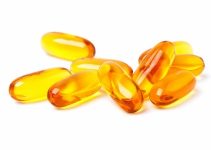Omega-3 Oils Types
Page Contents
Fish oil, cod liver oil and krill oil are high in the nonessential omega-3 polyunsaturated fatty acids eicosapentaenoic acid (EPA) and docosahexaenoic acid (DHA).
Flaxseed oil is high in the essential omega-3 polyunsaturated fatty acid alpha-linolenic acid (ALA).
You can consume omega-3 oils as part of fish, cod liver, as dietary supplements or additives to foods, such as non-alcoholic beverages, breakfast cereals, cheeses, frozen dairy desserts and medicinal food.
According to limited data, there is insufficient evidence of any significant health benefit of taking omega-3 oil supplements. Oils containing EPA and DHA may lower triglyceride levels, but it is not clear if they reduce the risk of heart disease or any other disease. Cod liver oil is a rich source of vitamins A and D, but if you eat a variety of foods you are not really at risk of vitamin A deficiency and you can bet all of vitamin D you need by exposure your skin (face and hands) to sun for about 30 minutes a week (spring to autumn, sunny weather, within 45 ° latitude) [26]. If you regularly eat fatty fish, which contain omega-r fish oil, you may not get much of additional benefit by taking omega-r oil supplements.
Chart 1. Omega-3 Oils Comparison | |
| OIL | COMPOSITION |
| Fish | EPA + DHA |
| Krill | Phosphatidylcholine containing EPA + DHA |
| Cod liver | EPA + DHA, vitamins A and D |
| Flaxseed | ALA |
Chart 1. legend: EPA = Eicosapentaenoic acid; DHA = docosahexaenoic acid; ALA = alpha-linolenic acid. Sources: USDA.gov [2,3,18,25], Examine.com [15]
Fish Oil
Fish oil can be consumed as:
- Part of fatty (oily) fish, such as anchovies, bluefish, halibut, herring, mackerel, menhaden, mussels, oysters, sable fish, salmon, sardines, seal blubber, shad, shark, tilefish (golden bass or golden snapper), trout, tuna, whale blubber and whitefish [1,2,3,4]
- Supplements (yellow capsules or liquids) that typically contain 1,000 mg or 1 g of oil extracted from fatty fish
Composition [25]:
- Monounsaturated fatty acids (30-55%)
- Omega-3 fatty acids EPA and DHA (20-40%)
- Saturated fatty acids (15-30%)
- Vitamin A and D (small amounts)
- Cholesterol (~5 mg/g)
Benefits. Fish oil can help lower high triglyceride levels, especially when taken along with cholesterol-lowering drugs statins [8,9]. Fish oil may slightly lower the blood pressure [27].
Dangers:
- Taking more than 3 grams of fish oil supplements increases the risk of bleeding.
- Regular consumption of high amounts of certain fatty fish, such as albacore (white) tuna, king mackerel, farmed salmon, shark, swordfish or tilefish, increases the risk of mercury toxicity [4,5]. Fish oils supplements do not likely contain dangerous amounts of mercury [6,7].
- Regular consumption of high amounts of bluefish, salmon, herring and sardines may increase the risk of polychlorinated biphenyls (PCBs) toxicity [5].
Fish oil is Generally Recognized As Safe (GRAS) by the U.S. Food and Drug Administration (FDA) [20].
Krill Oil
Krill oil is extracted from the ocean crustaceans and is available as supplements in the form of red capsules.
Composition [11,14]:
- Omega-3 fatty acids EPA and DHA, mainly in the form of phosphatidylcholine (marine lecithin) (30%)
- Saturated fatty acids (30%)
- Monounsaturated fatty acids (20%)
- Astaxanthin, which belongs to carotenoids (small amounts)
- Cholesterol (small amounts)
- Vitamin A and E (small amounts)
- Fluoride (unknown amounts)
Benefits. Krill oil may be better absorbed than fish oil, but there is INSUFFICIENT EVIDENCE that krill oil is effective in the prevention or treatment of high LDL or low HDL cholesterol or high triglyceride levels, osteoarthritis, premenstrual syndrome (PMS), rheumatoid arthritis, high blood pressure, stroke, cancer or depression or in promoting weight loss [11,13]. The producers claim krill oil has less side effects, such as burping, acid reflux and fishy odor [11]. The heat used during the production of krill oil may damage omega-3 fatty acids [12].
Dangers. Krill oil can slow down blood clotting and thus increase the risk of bleeding [13]. It can trigger allergic reaction in individuals allergic to fish, shrimps or other seafood [11]. It is not known if krill oil is safe during pregnancy and breastfeeding [13]. Krill oil is Generally Recognized As Safe (GRAS) by the U.S. Food and Drug Administration (FDA) [19].
Cod Liver Oil
Cod liver oil can be consumed as part of fresh cod liver or as a dietary supplement.
Composition [18]:
- Monounsaturated fatty acids (40%)
- Saturated fatty acids (25%)
- Omega-3 fatty acids EPA and DHA (25%)
- Vitamin A (1,000 UI/g) and D (100 IU/g) (amounts may vary greatly among brands)
- Cholesterol (~5 mg/g)
Benefits:
- Cod liver oil is LIKELY EFFECTIVE in lowering high triglyceride levels [16].
- Cod liver may slightly decrease high blood pressure and decrease protein loss in urine in diabetic kidney disease [16].
- Cod liver oil is POSSIBLY INEFFECTIVE in lowering cholesterol levels in familial hypercholesterolemia and in treatment of osteoarthritis
Dangers [16,17]:
- Increased risk of bleeding
- Vitamin A or D toxicity (hypervitaminosis A or D), when taken long term in large doses
- Side effects: nausea, diarrhea
Flaxseed Oil
Flaxseed oil can be consumed as raw flaxseed or as a dietary supplement in the form of liquid. Alpha-linolenic acid (ALA) is converted to small amounts of fatty acids EPA and DHA in the human body [23].
Composition [21,22]:
- Omega-3 polyunsaturated alpha-linolenic acid (70%)
- Monounsaturated fatty acids (20%)
- Saturated fatty acids (10%)
Benefits. There is INSUFFICIENT EVIDENCE about preventative or treatment of flaxseed oil in any disease, including anxiety, atherosclerosis, attention deficit-hyperactivity disorder (ADHD), cancer (breast, prostate), constipation, coronary heart disease, diabetes mellitus type 2, dry eyes and skin, high blood pressure, HIV/AIDS [23].
Dangers. Flaxseed oil is Generally Recognized As Safe (GRAS) by the U.S. Food and Drug Administration (FDA) [21]. It is LIKELY SAFE for most adults and POSSIBLY UNSAFE during pregnancy [24]. Doses above 30 g/day can cause diarrhea [24].



